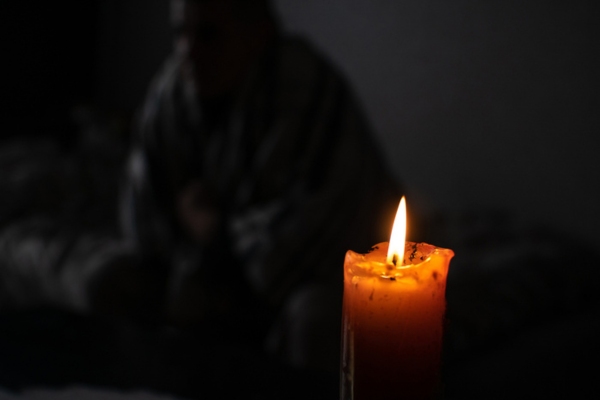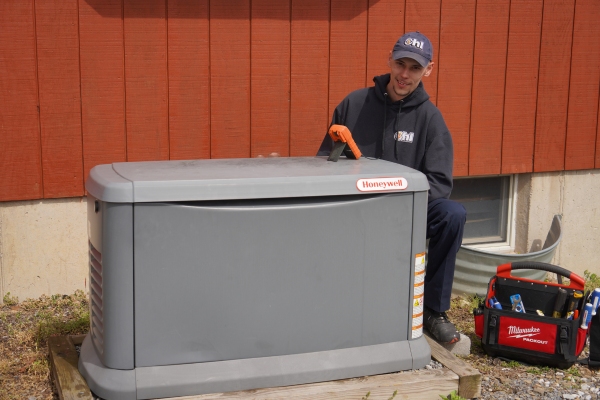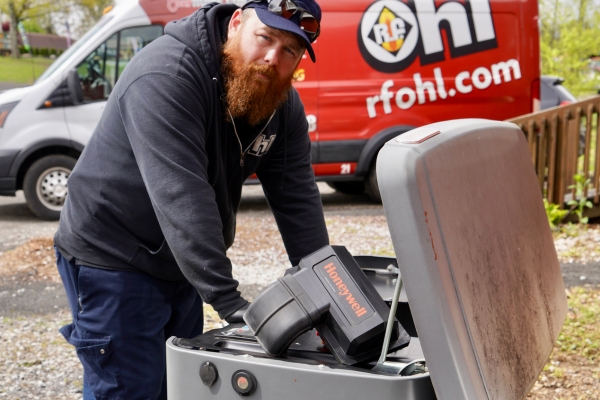Backup Generator Troubleshooting: What Can You Do When Your Generator Won’t Start

Standby backup generators are crucial in today’s world. They provide critical power support when outages occur due to storms, technical issues, or routine maintenance. These generators are vital for maintaining necessary operations and services when the main power grid is down.
However, it can be extremely frustrating to discover that your standby generator fails to start when you need it most. This article from R.F. Ohl aims to help you perform basic backup generator troubleshooting and address common problems that might hinder your generator’s startup. By following this article, you will acquire valuable knowledge and practical advice to keep your generator in optimal condition. This way, your standby generator is always prepared to deliver reliable power during an outage.
Understanding Standby Backup Generators
Contents
- Understanding Standby Backup Generators
- Significance of Regular Maintenance for Whole-House Generators
- Standby Generator Fails to Start: Typical Causes
- Backup Generator Troubleshooting Protocols
- When to Consult a Professional Generator Technician
- FAQs For Homeowners With Backup Generators
- How Frequently Should I Run Tests On My Home’s Backup Generator?
- What Is The Expected Service Life Of A Residential Backup Generator?
- How Can I Ensure My Power Generator Will Start During An Outage?
- What Routine Backup Generator Checks Can I Perform Between Service Visits?
- What Should I Do If My Generator Isn’t Providing Power During An Outage?
- Conclusion
- Call R.F. Ohl for Expert Backup Generator Solutions
Standby backup generators are essential systems designed to provide power during unexpected electricity outages.
Key Features of Power Generators
Standby generators are highly durable and advanced, delivering significant power capacity and versatility in fuel options, including natural gas, propane, or diesel. One of their key characteristics is the automatic transfer switch, which promptly senses any interruption in power and swiftly reestablishes the electricity supply, ensuring minimal disruption.
Don’t let a power outage catch you off guard—contact R.F. Ohl for expert generator maintenance.
Comparison with Portable Generators
Standby generators surpass portable models in both setup and functionality. These units are permanently fixed outside and directly linked to a building’s electrical system, allowing them to activate automatically when a power loss is detected, eliminating the manual intervention required by portable units.
Additionally, their power output is considerably higher, enabling them to support whole homes or business facilities, which is beyond the scope of portable generators with their more restricted capabilities.
Significance of Regular Maintenance for Whole-House Generators

Ensuring the dependability of your standby backup generator requires dedicated, regular maintenance. This includes routine inspections and prompt replacement of any deteriorating parts. Committing to a consistent maintenance schedule secures the generator’s readiness to function and prolongs its service life. This reinforces its reliability as a vital power source during unexpected power outages.
Ensuring your standby backup generator is professionally installed is crucial for correct setup, which reduces future problems and enhances performance efficiency. Furthermore, routine maintenance conducted by skilled technicians is essential to maintaining the generator’s longevity. It guarantees smooth operation when most needed and adheres to warranty requirements.
Make sure your generator is ready when you need it—book a maintenance check with R.F. Ohl now!
Standby Generator Fails to Start: Typical Causes

Fuel supply or fuel-related complications: This category includes issues such as obstructed fuel lines, contaminated or outdated fuel, and low fuel levels. Regularly monitoring and maintaining the fuel system is critical to ensure reliable operation in emergencies.
- Standby Generator Battery & Electrical Problems: These issues can arise from a depleted battery, compromised wiring, malfunctioning alternators, or incorrect connections. Consistent electrical system checks are crucial for promptly spotting and fixing these problems.
- Challenges with Controllers & Automatic Transfer Switches (ATS): Issues with a malfunctioning ATS can lead to failures in signaling the generator to start during a power outage. Additionally, errors in the controller or software glitches may inhibit proper startup. It’s essential to regularly verify that the ATS functions correctly and that controller settings are accurately configured.
- Engine-Related Backup Generator Complications: Problems may include issues with air intake, coolant, or lubrication systems. Degraded components such as spark plugs and filters can also impair engine performance. Routine engine inspections are vital to identify and resolve these issues before they turn more severe.
- Issues with Sensors & Safety Mechanisms: At times, sensors may become overly sensitive or improperly calibrated, leading to erroneous alerts or unnecessary safety shutdowns. Regular testing and recalibration of these sensors and safety mechanisms are crucial to preserve the generator’s reliability and effectiveness.
Experience peace of mind during any outage—reach out to R.F. Ohl for comprehensive generator solutions.
Backup Generator Troubleshooting Protocols

Attempting to repair a standby backup generator on your own is not advisable unless you are a qualified professional. DIY generator repairs can be hazardous and may result in severe consequences. The safest action you can take is to meticulously document any issues you observe with your generator. This record will be invaluable in communicating specifics to a technician upon their arrival. However, some of the procedures that a professional might undertake include:
Step 1: Initial Whole-House Generator Inspection
- Assess the overall physical state of the generator.
- Look for any noticeable damage or blockages.
Step 2: Standby Generator Fuel System
- Confirm there is sufficient fuel available.
- Tackle any issues related to fuel quality or contamination.
Step 3: Backup Generator Battery System
- Evaluate and, if required, replace the generator’s battery.
- Ensure battery connections are clean and tightly secured.
Step 4: Whole-House Generator Electrical System
- Inspect circuit breakers and fuses, resetting them as needed.
- Examine wiring connections and resolve any electrical issues.
Step 5: Controller & ATS
- Identify and resolve any problems with the generator’s controller.
- Evaluate the automatic transfer switch to ensure it functions correctly.
Step 6: Power Generator Engine System
- Check engine components for any issues.
- Verify that the engine is properly lubricated and cooled.
Step 7: Sensors & Safety Mechanisms
- Diagnose and replace any faulty sensors.
- Resolve any safety mechanisms that could inhibit startup.
When to Consult a Professional Generator Technician
Sometimes, despite our best efforts at troubleshooting, problems persist. In these cases, it is vital to recognize the value of a certified generator technician’s expertise. These professionals have the necessary skills and knowledge to pinpoint and remedy issues accurately.
Moreover, there are situations when contacting the generator manufacturer or dealer for specialized assistance is the most appropriate action. Understanding when to seek professional help can save time and prevent additional issues.
FAQs For Homeowners With Backup Generators

Here are some common questions and answers for homeowners with backup generators to help you understand and manage your system effectively.
How Frequently Should I Run Tests On My Home’s Backup Generator?
To maintain peace of mind and ensure reliability, you should test your backup generator monthly. Regular testing confirms its operational readiness for times of need. Always adhere to the testing guidelines provided by the manufacturer.
What Is The Expected Service Life Of A Residential Backup Generator?
The longevity of a residential whole-house generator often depends on how it’s used and maintained. With diligent care and routine servicing, many generators can effectively serve for 20 to 30 years.
How Can I Ensure My Power Generator Will Start During An Outage?
Ensuring your generator functions during an outage involves consistent maintenance and monthly testing. Keeping the fuel supply sufficient and storing the generator in a clean, dry environment is also essential. Consider scheduling annual servicing by a professional technician to maintain optimal performance.
What Routine Backup Generator Checks Can I Perform Between Service Visits?
Homeowners can proactively inspect their generators for visible signs of wear or damage, keep the area around the generator clear of debris, and check for oil or coolant leaks. For specific maintenance tasks and guidelines, always consult the owner’s manual.
What Should I Do If My Generator Isn’t Providing Power During An Outage?
Firstly, check to ensure enough fuel in the generator and verify that no circuit breakers have been tripped. If the issue continues and isn’t clearly identifiable, it’s advisable to call a professional technician. This helps prevent further damage by ensuring the problem is properly diagnosed and resolved.
Conclusion
This article has highlighted several key factors that can lead to standby backup generator startup failures, including fuel and battery issues, engine problems, and complications with automatic transfer switches. Backup generator troubleshooting is essential to identify these problems early. Emphasizing the necessity of professional services for both installation and regular maintenance is crucial for ensuring optimal performance and safety. We strongly advise relying on certified technicians to address generator issues, ensuring effective solutions and providing peace of mind through expert and dependable care.
Call R.F. Ohl for Expert Backup Generator Solutions
R.F. Ohl provides reliable whole-house generator services throughout Northeastern Pennsylvania. Our professionally certified technicians specialize in maintenance, repairs, and installations of standby generators.
Whether you need repairs, a new installation, or routine maintenance, our expert team is ready to deliver personalized services to meet your needs. We offer competitively priced generator solutions and guarantee your satisfaction.
Choose R.F. Ohl for reliable service, knowledgeable staff, and transparent pricing. Contact us today to schedule a service visit and receive a free in-home estimate.
Click here to contact us today or give us a call at (610) 377-1098 if you have any questions. Click the link to view our service area.

Related Articles: